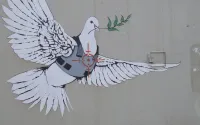25 November 2004The Guardian
The Ukraine crisis has sent a shiver of apprehension through Russia's immediate neighbours and east European countries with fresh memories of the bad old days of Soviet domination.
It is straining relations between Moscow and a divided EU, which is at a loss about what to do. And it may yet force President George Bush to relax his warm embrace of Russia's two-timing leader, Vladimir Putin.
Four days after Ukraine's discredited election, geopolitical shock waves are continuing to spread. Ukraine is rocking the post-cold war consensus, exposing its fragility for all to see. It has become a symbol of how, in a wired-up, interdependent world, one country's upheavals can quickly become everybody's problem.
In the newly independent countries of Russia's "near abroad", the stakes are particularly high. States such as Georgia worry that Mr Putin is pursuing a policy of "soft imperialism" to reassert Moscow's sway over its former territories and satellites.
For Georgia, Ukraine is a cautionary tale. Only last week, it warned Moscow to stop interfering in its breakaway region of Abkhazia. But Russia has refused to withdraw all its troops. Mr Putin's attitude to the US-backed leadership in Tbilisi remains ambivalent, if not hostile. Though largely ignored since its "rose revolution" a year ago, Georgia remains a potential east-west flash point.
Ukraine's woes may bring other unresolved conflicts to the fore. In Moldova, on Ukraine's south-western border, Russia has broken its 1999 promise to remove its forces from the separatist Transdniestria region. This dispute, involving Nato, has delayed ratification of a Europe-Russia force reduction treaty.
In Belarus, another of Ukraine's neighbours, Alexander Lukashenko's unpopular regime will be inclined to huddle ever closer to Moscow. But for anti-western, nationalist forces in the Balkans, this week's developments may be a boon.
Serbia, like Ukraine a Slavic country within Russia's traditional sphere of influence, is still smarting from the 1999 US-led bombing campaign and its de facto loss of Kosovo. The government of Vojislav Kostunica may welcome Moscow's renewed political muscle-flexing.
The fall-out goes further. Former Warsaw Pact countries such as Poland, whose economic progress and integration into the EU and Nato were held up as a model by Ukraine's opposition, were already alarmed by Mr Putin's post-Beslan moves to centralise power in the Kremlin and by his attitude to the "near abroad".
"We are facing a restoration of the Russian empire through economic means," Zbigniew Siemiatkowski, a former intelligence chief, told Poland's parliament last month. He was referring specifically to Russia's use of its oil and gas exports, as in energy-dependent Ukraine, as a political tool.
Seeking a united front, a group of 10 Scandinavian and east European countries met in Brussels last month. The three Baltic republics, in particular, want a more robust, or at least an agreed, EU line in dealing with Mr Putin. Some among the 10 would like to build on the EU's "Neighbourhood Policy" by offering future membership to Ukraine and Belarus. But a common EU approach to Ukraine is signally lacking.
West European countries were hesitating yesterday in the face of Mr Putin's wrath. With Turkey's application looming, Ukrainian EU membership is seen by them as a bridge too far. But Ukraine's disintegration could cause even bigger headaches, such as a possible refugee exodus. So their cry now is for compromise, dialogue, or a rerun poll.
More than a stolen election, the main EU players fear a protracted crisis that damages cooperation with Russia on issues ranging from trade and terrorism to Iran, North Korea and Israel-Palestine. This forms the context for today's awkwardly timed EU-Russia summit.
Similarly hard-headed calculations will affect Washington's next moves. A cooling of the Bush-Putin relationship may be in prospect, but realpolitik suggests there is too much to lose if Ukraine's troubles were to be allowed to poison broader US relations with Moscow.
This disinclination to confront Russia might be termed the Chechnya effect. And it bodes ill for the democrats of Ukraine.






